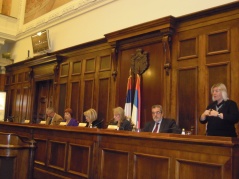National Assembly of the Republic of Serbia / Activities / Activity details

Thursday, 8 December 2011
Public Hearing Held on the Presentation of the Subgroup’s Report on the Implementation of the Law on the Basis of the System of Education and Upbringing – Segment Relating to Inclusion
A public hearing on the “Presentation of the subgroup’s report on the implementation of the Law on the Basis of the System of Education and Upbringing – segment relating to inclusion”, organised by the Children’s Rights Working Group and with the support of UNICEF, was held today at the National Assembly House.
On the behalf of the Children’s Rights Working Group, the assembly was greeted by the National Assembly Speaker Prof. Dr Slavica Djukic Dejanovic who stressed the importance of including special needs children into the regular system of education and upbringing. The Law on the Basis of the System of Education and Upbringing, adopted in 2009 and in force since the 2010/2011 academic year, contains clear provisions guaranteeing a better quality of education, inclusion and anti-discrimination of the most vulnerable children, including the poorest, Roma children and special needs children, said the National Assembly Speaker. The National Assembly’s Children’s Rights Working Group, created in 2009, follows the implementation of adopted laws in the segments relating to children, and performs all of the National Assembly’s basic functions: legislative, representative and oversight. The Working Group has also published a Handbook for the MPs on the exercise of the rights of children with disabilities, focusing on inclusion, concluded Speaker Djukic Dejanovic.
MP Milica Vojic Markovic, member of the Children’s Rights Working Group and coordinator of the subgroup monitoring the implementation of the Law, presented the subgroup’s Report on the implementation of the Law on the Basis of the System of Education and Upbringing – segment relating to inclusion. Unconditional educational inclusion, equal rights to education for all, without discrimination is the goal of all the factors in education.
The subgroup members visited schools – examples of good practice which have overcome the fear of inclusion, and cooperation between school expert teams, local self-governments’ interdepartmental commissions, principals and parents was intensified. The subgroup prepared a questionnaire for monitoring the implementation of the Law, and the answers revealed the existence of common problems in schools such as lack of teaching materials, lack of will among the teaching staff to deal with inclusion, lack of educated participants in the labour process, as well as lack of systemic assistance by expert teams, stressed Milica Vojic Markovic. The insufficient number of personal assistants and clear regulation of the position of the pedagogic assistant are also a big problem.
National Assembly Deputy Speaker and subgroup member Nikola Novakovic presented the examples of good practice, stressing the key role of the pedagogic assistant in child development and how important it was to clearly define the funds allocated for pedagogic assistants for special needs children.
MP Milan Stanimirovic, subgroup member, was pleased to see schools which love their children, adding that prejudice, often encouraged by parents themselves by not letting their children join regular classes with their peers, needed to be eradicated.
Considering that the work on the implementation of inclusive education is interdepartmental, State Secretary at the Ministry of Education and Science Tinde Kovac Cerovic, Assistant Minister of Health Dubravka Saranovic Racic, Assistant Minister of Labour and Social Policy Suzana Paunovic, advisor at the Ministry of Human and Minority Rights Svetlana Djordjevic, Deputy Ombudsperson for Children’s Rights Tamara Luksic Orlandic and AP Vojvodina Ombudsperson Aniko Muskinja Hajnrih spoke about their experience, achieved results, as well as perceived flaws.
The MPs, UNICEF representative, representatives of the Inclusive Education Support Network, representatives of non-governmental organisations and elementary schools took part in the public hearing. In the debate, they noted that, in support to inclusive education, numerous handbooks, regulations and rulebooks have been published, trainings organised, but some schools still face the problem of teachers insufficiently trained to work with special needs children, the lack of pedagogic assistants or pedagogic assistants with the wrong professional profile, as well as lack of motivation among the teachers to work with special needs children.
The coordinator of the subgroup monitoring the implementation of the Law Milica Vojic Markovic informed the assembly that a proposal of the conclusions from the public hearing would be submitted to the Children’s Rights Working Group for adoption.
-
12.30 - the National Assembly Speaker meets with the ODIHR Director (National Assembly House, 13 Nikola Pasic Square)
-
13.00 - the Chairman of the Committee on Human and Minority Rights and Gender Equality meets with the delegation of the OSCE Mission in the Republic of Serbia (National Assembly House, 13 Nikola Pasic Square, hall 3)




